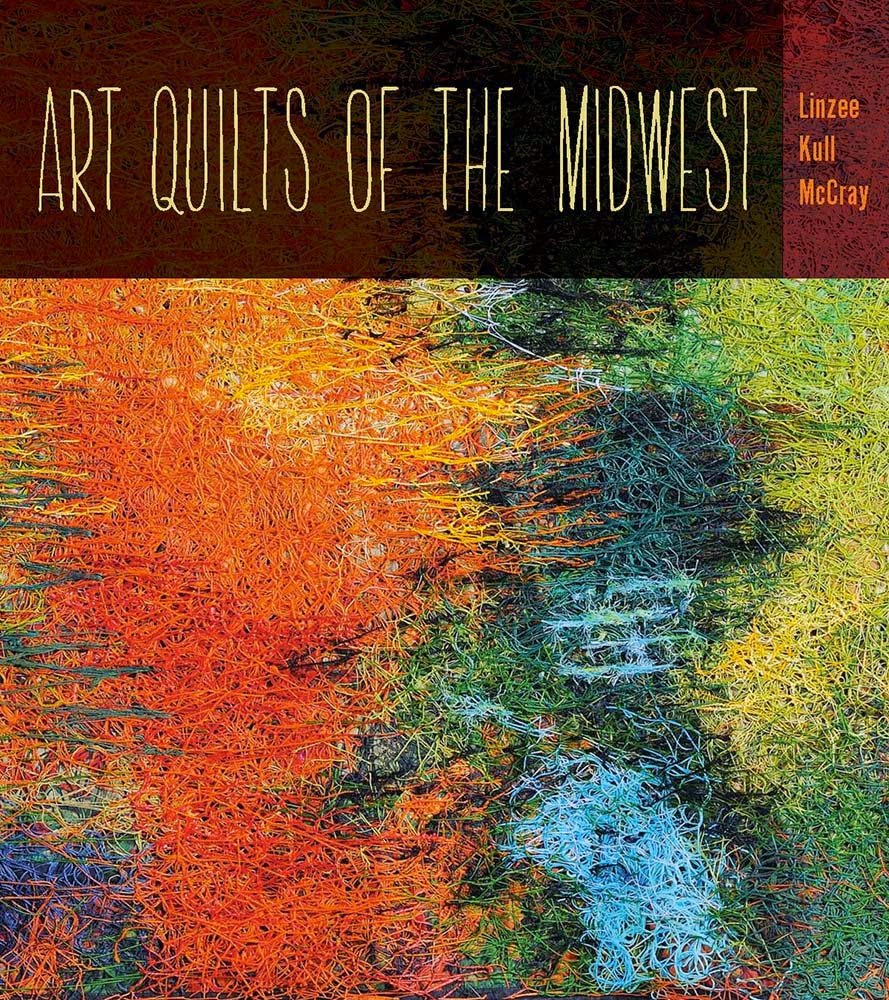Friday, March 27 @ 6:00P
Home Ec Workshop
207 N. Linn Street, Iowa City, IA
Author Linzee Kull McCray and I officially launch her new book
The evening will also include a screening of my video “A Piece of Me.”
Artist List:
Marilyn Ampe, St. Paul, Minnesota
Gail Baar, Buffalo Grove, Illinois
Sally Bowker, Cornucopia, Wisconsin
Peggy Brown, Nashville, Indiana
Shelly Burge, Lincoln, Nebraska
Shin-hee Chin, McPherson, Kansas
Sandra Palmer Ciolino, Cincinnati, Ohio
Jacquelyn Gering, Chicago, Illinois
Kate Gorman, Westerville, Ohio
Donna Katz, Chicago, Illinois
Beth Markel, Rochester Hills, Michigan
Diane Núñez, Southfield, Michigan
Pat Owoc, St. Louis, Missouri
BJ Parady, Batavia, Illinois
Bonnie Peterson, Houghton, Michigan
Luanne Rimel, St. Louis, Missouri
Barbara Schneider, Woodstock, Illinois
Susan Shie, Wooster, Ohio
Martha Warshaw, Cincinnati, Ohio
Erick Wolfmeyer, Iowa City, Iowa
American Legion Building
625 31st Street
Marion, IA
Morning meeting: 9:00AM; “A Piece of Me” presentation at 10:00AM
Evening meeting: 7:00PM; “A Piece of Me” presentation at 8:00PM
Lakota prayer flags at the top of Bear Butte
Sunset at the base of Bear Butte
Looking south from halfway up Bear Butte
Sawmill, Hill City
Child’s profile, Bear Butte
Roughlock Falls, Spearfish Canyon
Hike to Roughlock Falls, Spearfish Canyon
Stroppel Inn, Midland, South Dakota
Unique forms of art on display at Catich
by The Buzz staff writer Brooke Schelly
Hanging on the walls of St. Ambrose University’s Catich Gallery are pieces that are not typical pieces of art. These pieces are not comprised of brush strokes or captured by a camera. They don’t display well in frames or require intense abstract thinking. Rather, they celebrate the simple things in life: fabric and paper.
The Catich Gallery in the Galvin Fine Arts Center will display works by Erick Wolfmeyer and Brian Borchardt from Sept. 10 to Oct. 24. A special artist lecture by Wolfmeyer and Borchardt will take place in Galvin Room 141 on Thursday, Sept. 18, from 4-4:45pm. Join the artists in the Catich Gallery for a reception following the artist lecture from 5-7pm that same evening.
Erick Wolfmeyer designs and creates quilts. His work is filled with detail and finesse, so it is no wonder that there is more beneath the surface. Wolfmeyer’s journey began at a young age after being adopted. Although he had parents, he always wondered what his biological family was like. Through the years he grew to better understand himself, his adoptive family and eventually his biological family as well. This exprience has shaped who he is today, and is reflected greatly in his quilting.
“My work is inspired by the search for and construction of identity and relationship,” Wolfmeyer said. “Much of it is, like many art forms, at the deepest level – autobiographical.
“The quilts are the results of my wrestling with parts of my life in this medium of quiltmaking, which I think of as abstract expressionism. I essentially paint and construct with fabric. The quilts become a metaphor for piecing my identity together, day by day, year by year, as I acknowledge, honor and integrate the losses I experienced as an adoptee.”
Wolfmeyer created his first quilt for a friend in 1998. From there, he created quilts for purchase and for gallery showings. One piece in particular, “Portmanteau,” brought him numerous opportunities. The word portmanteau can be defined as ” a large trunk or suitcase, typically made of stiff leather and opening in two equal parts.” Although this definition is reflected in Wolfmeyer’s quilt as the main shape of the piece, it also can be seen on a deeper level.
“The quilt brings together light and dark and addresses the dichotomous split in consciousness I have experienced as an adoptee between nature and nurture, my two names, two sets of parents and two parallel realities,” Wolfmeyer said. “There is a phantom life that walks beside the one I am living – one that begs the question: ‘What if…’ It is this very question that drives the creative process for me.”
For Wolfmeyer it is hard to choose a favorite piece of art, mainly because it is the process he enjoys the most. The quilt is created over a long period of time, usually between six months to a year. The quilt can only be enjoyed in the short-term due to the fact that it will either quickly be purchased or sent off to be shown in a gallery.
“No quilt is a favorite,” Wolfmeyer said. “Like children, each means something different to me. It’s usually connected to what was going on in my life at the time I was making it and/or what came about as a result of having made a particular quilt at a particular time.”
Showing alongside Wolfmeyer are a collection of books celebrating paper and typeface created by Brian Borchardt.
“My work combines my passion for books, reading and printing,” Borchardt said in an artist statement released to the university, “The physical nature of books is strongly ingrained in my desire to create pieces that are tactile, intriguing and accessible.”
Borchardt started making books after being introduced to Book Arts through two close friends from Stevens Point, Wis. Shortly thereafter, he started making books with little to no background training or education in teh field. In 2003, he created a private press located in Stevens Point called Seven Hills Press that produces limited edition letterpress books.
“The name Seven Hills Press was inspired by my first trip to the wonderful city of Rome,” Borchardt said.
The Catich Gallery is open Monday-Friday, 9am-5pm or by appointment. For more informartion about Erick Wolfmeyer, visit his website,
www.ewolfmeyerquilts.com. To learn more about Brian Borchardt, his website is located at
www.sevenhillspress.com.
With Allison Filley, St Ambrose Art Department staff
Without our connection, this exhibit would not have happened!
With fellow exhibiting artist, Brian Borchardt
Thanks to the Catich Gallery former and present staff (Leslie, Kristin, Joseph and Kat) and student (Catherine) for making the installation of “A Piece of Me” such a success. I really appreciate their sensitivity to the work, professionalism and aesthetic instincts! The exhibit is in good hands and a beautiful space!
Catich Gallery
518 West Locust Street
Davenport, IA 52803
563-333-6444
Artist Talk/Lecture: Thursday, September 18, 4-4:45PM
Opening reception: Thursday, September 18, 2014, 5-7PM
Gallery hours: Monday-Friday 9AM-5PM
My quilts will be exhibited along with the work of bookmaker,
Brian Borchardt. Please join me for the reception and lecture on September 18, 2014. I plan to hang 5 pieces, 3 of which have never been exhibited prior to this show.
Swim, 2013 (currently on tour with The Sum of Many Parts)
“The Sum of Many Parts: Quiltmakers in Contemporary America presents15 quilts in varying styles, created by artists who are actively producing work today. Hailing from 14 different states, the artists featured in the exhibition boast diverse backgrounds and paths that led them to textile art. Some began quilting and sewing in their youth, while others did not pursue the art form until adulthood. Many learned the craft at home, creating practical blankets for their families. Others are academically trained artists who chose textiles as their primary medium.” – Exhibits USA
May 15-June 20, 2014
Washington County Museum
Portand, OR
July 5-August 16, 2014
Argenta Branch Library
North Little Rock, Arkansas
October 21, 2014-January 19, 2015
Chadron State College
Chadron, Nebraska
February 3-March 10, 2015
Jones-Carter Gallery
Lake City, South Carolina
March 25-August 16, 2015
The Foundry Art Centre
St. Charles, Missouri
Hallye Bone with “Swim” at The Foundry Art Centre, St. Charles, MO
The Foundry Art Centre, St. Charles, MO
September 1, 2015-January 19, 2016
Crealde’ School of Art
Winter Park, Florida
Several years ago, a friend and I visited the Heath Ceramics studio in Sausalito, California. I have been a fan of their beautiful tile and ceramics ever since. Last summer in preparing to renovate my bathroom, I stumbled upon some neat little square-images of tile samples on the Heath website. I quickly realized I couldn’t afford Heath tile for my project, but I could cut and paste the sample images into a quilt design idea that I would save for a later date.
I was finally able to start the piece and my goal is to have it finished by the end of April, so there’s time to get it hand-quilted and ready for a show this September at the Catich Gallery at St. Ambrose University in Davenport, Iowa. Here is the work in progress:
sketch
Each strip takes about an hour to construct,
not including the time it took to pre-cut the pieces
A finished 24 x 24 inch blue square
This image (four – 24 x 24 inch squares) represents only a quarter of the finished piece
Finally finished the top on Saturday, April 12th, 2014. Shipping off to hand-quilters early this week in hopes of having it finished for the Catich Gallery show at St. Ambrose University (Davenport, IA) this fall. Fingers crossed!! My house isn’t big enough to photograph the whole quilt, so thanks to
Inspirations in Hills, IA for letting me borrow their design board to drape most of it for a pic.
I always put a label on my quilts. I hand-stitch it to the lower right hand corner of the back. The labels are inspired by old-fashioned hang tags and include:
-
Quilt-maker’s signature
-
Title
-
Quilt size
-
Year of completion
-
Number of pieces
-
Place where it was made
- Quilting information (*)
- Website
Prior to constructing the label, I adhere freezer paper to the back of the fabric, which makes it much easier to do the writing (with Sharpies – one thick, one thin).
Someday, the label may be the most important part of a quilt. Imagine pulling a quilt out of a trunk in your late uncle’s attic and finding a label which would give you at least some of the quilt’s provenance. No matter what the quilt looks like or it’s condition, the label would be the most intriguing and exciting find!
*I am unable to directly credit my Amish hand-quilters in accordance with their cultural tradition.
Join me to make the
Modern Quilt Relish quilt pattern, “Taffy Twists.” The class is limited to four people with the following quilt-making skills (or willing to learn them very quickly): read and follow pattern; confident, safe, accurate rotary-cutting; “fussy” open-seam ironing; consistent, accurate “scant” 1/4-inch seam sewing. With these skills well in-hand, the pattern is easy to follow and fun to put together.
I made the Throw size (60″ x 78″), but you can make whatever size you like
(pattern has four size options: Table Runner, Baby, Throw, Queen).
Laffy Taffy, my dog
“Wonky” Double Cross
Learn to make this wonderful quilt pattern by Pam Rocco. Work toward a finished 50″ x 50″ quilt in this 6-hr class, or take the top home and make three more to construct a quilt fit for a QUEEN! Perfect gift for a bun in the oven or for someone you love bunches! Whimsical and loose: recovering perfectionists welcome
















Recent Comments